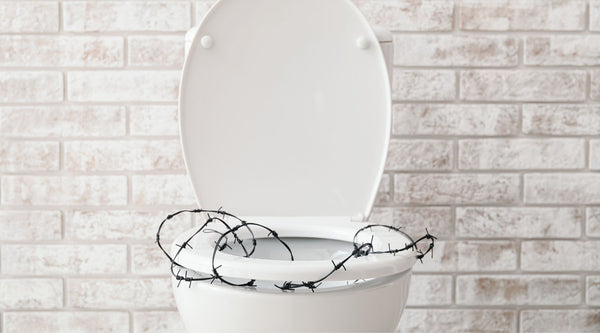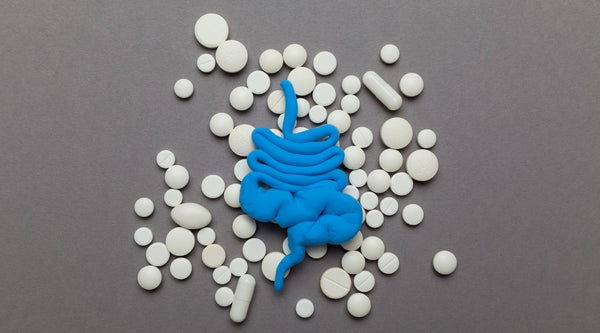3 Proven Ways to Treat Irritable Bowel Syndrome (IBS)
Do you suffer from irritable bowel syndrome (IBS)? If so, you know how uncomfortable and embarrassing it can be. IBS is a common digestive disorder that affects millions of people all over the world. Symptoms can vary from person to person, but often include abdominal pain, bloating, constipation, and diarrhea. In this blog post, we will discuss 3 proven ways to treat irritable bowel syndrome and get relief from your symptoms!

What is Irritable Bowel Syndrome (IBS)?
Irritable Bowel Syndrome (IBS) is a chronic illness that affects the digestive system. The cause of IBS is unknown, but it is believed to be caused by a combination of factors including diet, stress, hormones, and genetics that cause adverse reactions in your digestive tract. Irritable bowel syndrome affects both men and women, and it is the most common gastrointestinal disorder in the world.
IBS affects around 25-45 million people (about twice the population of New York) in the United States, but there are many other people who suffer from IBS as well who do not know how to identify the symptoms or just ignore the symptoms. Some people suffer from inflammatory bowel disease (IBD) and kidney diseases but mistake it for IBS. It is especially important for someone to be officially diagnosed with IBS by their healthcare provider because digestive and kidney diseases can cause serious complications if not treated.

IBS Symptoms
There are some common IBS symptoms that almost all people who suffer from IBS experience. The symptoms can vary and depend per person, but here are the most common IBS symptoms that could experience in your digestive system:
- Gas
- Bloating
- Constipation
- Diarrhea
- Abdominal Pain
- Nausea
- Fatigue
Abdominal Pain
Abdominal pain is one of the most common IBS symptoms due to spasms in the intestine that occur after eating certain foods. The pain can vary from mild to severe, and it is usually worst after eating.

Gas
Gas is also one of the most common IBS symptoms that occur after eating. Many people experience gas daily, but gas accompanied by bloating and abdominal pain is a sign of IBS.
Bloating
Bloating is another one of the most common IBS symptoms that can be triggered after eating certain foods. Bloating is when the stomach swells up to an abnormal size due to increased gas caused by the digestion of IBS trigger foods.
Constipation
Some people experience constipation with their IBS while others experience severe diarrhea. Constipation can be uncomfortable as well and can lead to severe bloating.
Diarrhea
Diarrhea can be one of the most severe symptoms associated with IBS. Some people experience diarrhea every day while others only have it occasionally. Diarrhea can cause dehydration and extreme fatigue if it is not treated soon enough.

IBS Diagnosis
If you are experiencing any of the symptoms mentioned above, then you should meet with a healthcare provider for an official IBS diagnosis. There are a few tests that healthcare professionals typically use to diagnose digestive conditions like IBS or IBD. Here are some of the common tests you may experience:
- Colonoscopy
- Upper endoscopy
- CT Scan / X-ray
- Breath tests
- Stool tests
IBS Treatment
Once you have been diagnosed with IBS by your healthcare professional, you will receive IBS treatment. Unfortunately, there is not a "cure-all" for IBS, but there are some proven treatments that can treat IBS and relieve IBS symptoms. Other treatments are only meant to manage IBS symptoms to ensure the patient can have a normal life with fewer flare-ups. Below, we are going to go over the 3 different types of IBS treatments that are good for reducing IBS symptoms and can treat chronic pain.
IBS Medication and Supplements
IBS medications and supplements is the first category of treatments that we will be discussing. There are many different types of medications and supplements that claim to help ease IBS symptoms and provide relief, but we will discuss the most common medications and supplements used to manage symptoms.
Anti-diarrhea medications: This is one of the few over-the-counter medications that you can get to help treat your IBS symptoms. Anti-diarrheal medicine can help ease stomach cramps and limit your visits to the bathroom. Over-reliance on this medicine can lead to constipation though.
Alternative medicine: There are some natural herbs and remedies that can be used to ease IBS symptoms. Some of the most common alternative medicines used are primrose oil and peppermint oil. Both peppermint oil and primrose oil have shown good success at easing IBS symptoms. Peppermint oil is usually used to help ease an irritable colon.

Fiber supplements: Supplements that provide extra fiber have been shown to improve symptoms and improve bowel movement for people with IBS. People with IBS can also try to eat more foods that are high in fiber if they do not have access to supplements that provide extra fiber.
Probiotics / Prebiotics: Probiotics and prebiotics are supplements that deliver healthy bacteria to the gut which helps improve digestion and overall gut health.
Tricyclic antidepressants: These anti-depressants are typically used to control neutrons that register pain in the stomach. They are used in small doses as a pain reliever for IBS patients.
Pain medication: There are certain pain medications that doctors prescribe that ease pain as well as bloating and gas.
IBS-specific medications: Alosetron, Eluxadoline, Rifaximin, Lubiprostone, Linaclotide are some prescription medications used to treat IBS. Ask your healthcare provider about these medications to see if they would be right for your IBS treatment.

IBS Nutrition
Diet changes are one of the best and highly proven ways to improve bowel movement and ease bowel disorders. Some foods that you love will trigger symptoms and make symptoms worse, which makes dietary changes important to experience significant improvement.
Low FODMAP Diet: The Low FODMAP diet is the most proven diet to help ease IBS. This diet was created by Monash University in Australia. The researchers at the University identified 5 carbohydrates that many people have trouble digesting. These 5 carbs known as FODMAPs are removed from your diet and then reintroduced one at a time to figure out which foods trigger symptoms and unwanted bowel movements. Once you have identified your trigger foods, you will be able to reintroduce the other FODMAPs into your diet and personalize your diet however you would like.
Dairy-free diet: Some healthcare providers suggest a lactose test to see if you have a dairy allergy. Another way to test on your own is by undergoing a dairy-free diet to see if your symptoms and unwanted bowel movements subside.
Gluten-free diet: Another test that healthcare providers suggest is for a gluten allergy. You can cut gluten out of your diet for good measure if you are looking to eliminate a gluten allergy as a possibility.
High-gas foods: Another type of food that can cause IBS-like symptoms are foods that are high in gas such as highly carbonated liquids. It is good to eliminate these from your diet to see if you are still experiencing other symptoms that would point to IBS as the culprit.

IBS Psychological Treatment
IBS psychological treatment is also known as a mental health therapy for IBS. There are some different mental health therapies out there that can improve bowel function, but research suggests that this type of treatment will not work for everyone. That is why it is important to try alternative therapies to ensure you can find a way to ease symptoms.
Many IBS patients experience symptoms that stem from anxiety and stress. That is why it is important for all people with IBS to practice relaxation techniques and find healthy ways to relieve stress on a regular basis. Emotional stress is not good for your brain, heart, or your gut health.
Some Common Mental Health Therapies for IBS
There are a few common mental health therapies that people with IBS can try as well as an app that is meant to retrain the brain and ease symptoms.
- Nerva: Nerva is an app that claims to bring IBS relief without medication or diet changes. It may not work for everyone, but it is worth a try if you are looking for IBS relief.
- Meditation: Meditation has been around for thousands of years and is proven to calm the body, mind, and spirit. Some people claim that meditation can ease the body and bring you IBS relief.
- Deep breathing: Deep breathing techniques have been shown to be beneficial for calming the body, mind, and spirit as well. Calming your body can bring quick IBS relief.
- Hypnosis: This will not work for everyone, but there are studies that hypnosis can help retrain your brain, which can lead to IBS relief.
- Cognitive behavioral therapy (CBT): CBT teaches people how to change their way of thinking to avoid anxiety-inducing thought processes that cause IBS. This interpersonal psychotherapy has shown impressive results in helping people change the way they think and approach problems in their life that might trigger their symptoms.
Living With IBS
Living with IBS can be incredibly challenging and can lead to lifestyle changes, nutrition changes, and cause emotional distress on a daily basis. Treating IBS is not a one-shoe that fits all scenarios so you might have to try multiple treatments that we mentioned above or a combination of a few. Luckily,many people who are suffering from the same disorder who have found different ways to deal with it, so you are not alone.

You Are Not Alone
One of the best pieces of advice we can offer for people suffering from a chronic digestive condition is to join a community. You are not alone! It helps to surround yourself with people who are experiencing the same issues as you are and will improve your IBS management. Plus, it is always a good thing to talk to people who understand what you are going through and can offer tips, advice, or experiences of their own.

Need Help with IBS Nutrition?
Nutrition is hard for everybody, but it is especially hard for people who suffer from irritable bowel syndrome. Unfortunately, people with IBS do not have a great relationship with food and experience anxiety when they have to eat out somewhere.
We suggest you try the Low FODMAP diet to help improve your relationship with food. The diet will help you find your trigger foods and personalize your diet, so you won't have to worry about experiencing your symptoms as often. 80% of people report impressive results within as little as 2 weeks!
If you are interested in learning more about the Low FODMAP diet, then click this link: Low FODMAP Information
 >
>